Gainesville in August: Zoning, Rental Protections, and GRUA
July was a low month, we're coming back and finishing the summer with some decisions on housing and clarity on the state takeover of our city
We’re officially into August. July was a low month for the Commission, we were on our summer break for the first three weeks of the month. But we’re back at it now, and have a relatively stocked August to walk back into.
First, some good news
Lights have been added to Possum Creek Skate Park, which means skateboarders can hang out until 11:30, a much-needed improvement for these hot summer days.
The City keeps crossing off more of our state audit findings. A new high-speed fiber broadband provider, IQ Fiber, will be breaking ground on their $40 million buildout this month giving residents a better, fiber-speed option for broadband, with the goal to have homes online by early next year. The City was designated a “Tree City” for the 42nd year in a row. There’s now a direct flight from Gainesville to Ft. Lauderdale through Gainesville Regional Airport.
Getting clarity on the GRU Authority
This month we’ll begin to get some clarity around the Governor’s takeover of our city utilities. Governor DeSantis is expected to announce who will take over Gainesville’s utilities under his new “GRU Authority”, we’ll learn whether the implementation will be stalled under an injunction, and hopefully we’ll begin to clear the multitude of contradictions and ambiguities within the law.
The lawsuit will (hopefully) be heard
In late July the City of Gainesville filed its lawsuit in state court to end, or at least give us clarity on, the implementation of HB 1645, the governor’s takeover of Gainesville’s five utilities. Simultaneously a community group, led by former GRU employee and County Commissioner Hutch Hutchinson, has filed a case in federal court. These two cases are running simultaneously, and the stakes are huge: will the City of Gainesville be under the permanent control of the state of Florida, or will our residents be able to govern ourselves?
Remember, GRU is a “fictitious name” for five of the city’s departments, GRU is not separate from the City of Gainesville. Taking over GRU is not a takeover of some utility tangentially associated with our city, it’s a takeover of our city government.
The City’s case is very well written and feels watertight. You can read the complaint here or the motion for a temporary injunction here. If you want to read one I’d recommend the temporary injunction: it’s a little more to the point and a better read.
The core of the argument is simple: the Florida Constitution and the laws that came from that were designed to uphold a strong separation of powers, home rule for cities, and protections against transferring rights and powers from a city to another entity. This state takeover, passed by special law, runs afoul of each of those. Nothing like this has ever been tried or even contemplated in Florida history, so there’s little case law or direct law that speaks to it. I think that shows that clearly the Constitution does not allow a state takeover of a city, and thus it’s never happened before, but because there’s no case law it leaves a lot of discretion in the hands of the judge.
Our City Attorney has said the lawsuit could be heard in 4-6 weeks, which puts us into late August or early September to know whether the GRU Takeover is moving forward or will stall in litigation. It could be earlier, could be later, but that’s the estimate right now.
Even if it’s not struck down in its entirety the City is hoping to at least get clarity on ambiguous passages. For instance: throughout the bill it refers to “the City” as one entity and “the Authority” as another, even though GRU is a “unit of the City of Gainesville”. What portions are supposed to be free from Commission control vs City control? What even is the distinction? What does it mean to “submit” a budget? What is the status of the GRU General Manager, who at the moment doesn’t exist but will exist upon selection by the Authority?
The issues are summed up well in this passage from the complaint by the City:
There are many other internal contradictions, some of which are identified in this Complaint, and any one of which makes HB 1645 impossible to implement legally or in fact . . . HB 1645 is so unconstitutionally vague as to place the City and its officials at risk for violating the statute and other areas of Florida law, that are contradictory to this special law, without an intent to do so. To the extent that HB 1645’s direction to the City can be understood, that direction violates state constitutional law and several general laws.
We’re between a rock and a hard place on the City Commission, trying to follow a state law that makes little sense and was sloppily rushed through the legislature at the last minute, with little vetting, and passed by party-line vote. At minimum, we need some direction on how to implement this thing, which hopefully a judge will grant us.
The Governors appointees
At the same time, this month Governor Ron DeSantis is planning to select who his appointees will be, and that will tell us a lot.
Rep. Clemons has expressed that the board should be experts in utilities. Will it be, or will it be Republican party loyalists and activists, like who the Governor selected for the Reedy Creek Improvement District? Rep. Clemons has claimed GRU has been mismanaged and needs new leadership. Will the Governor select new leadership, or people that have been making decisions for GRU for years? Rep. Clemons has claimed the goal of the new board is not to privatize the utility. Will DeSantis select people committed to a utility “owned by the people it serves”, or people like Nathan Skop and former mayoral candidate Ed Bielarski, who have openly advocated for selling the electric utility to Florida Power & Light? Will this board be stocked with community members or industry lobbyists? Will they prioritize what’s best for our community, or try to settle scores and cause more chaos?
That’s the million-dollar question. If this law stands as constitutional we need some stability for our City Government and utility. That’s why last week I brought forward a series of directives for staff to ensure an “orderly transition to Gov. Ron DeSantis’ GRU Authority” that included solidifying all shared services, updating ordinances, and letting the community know about this change.
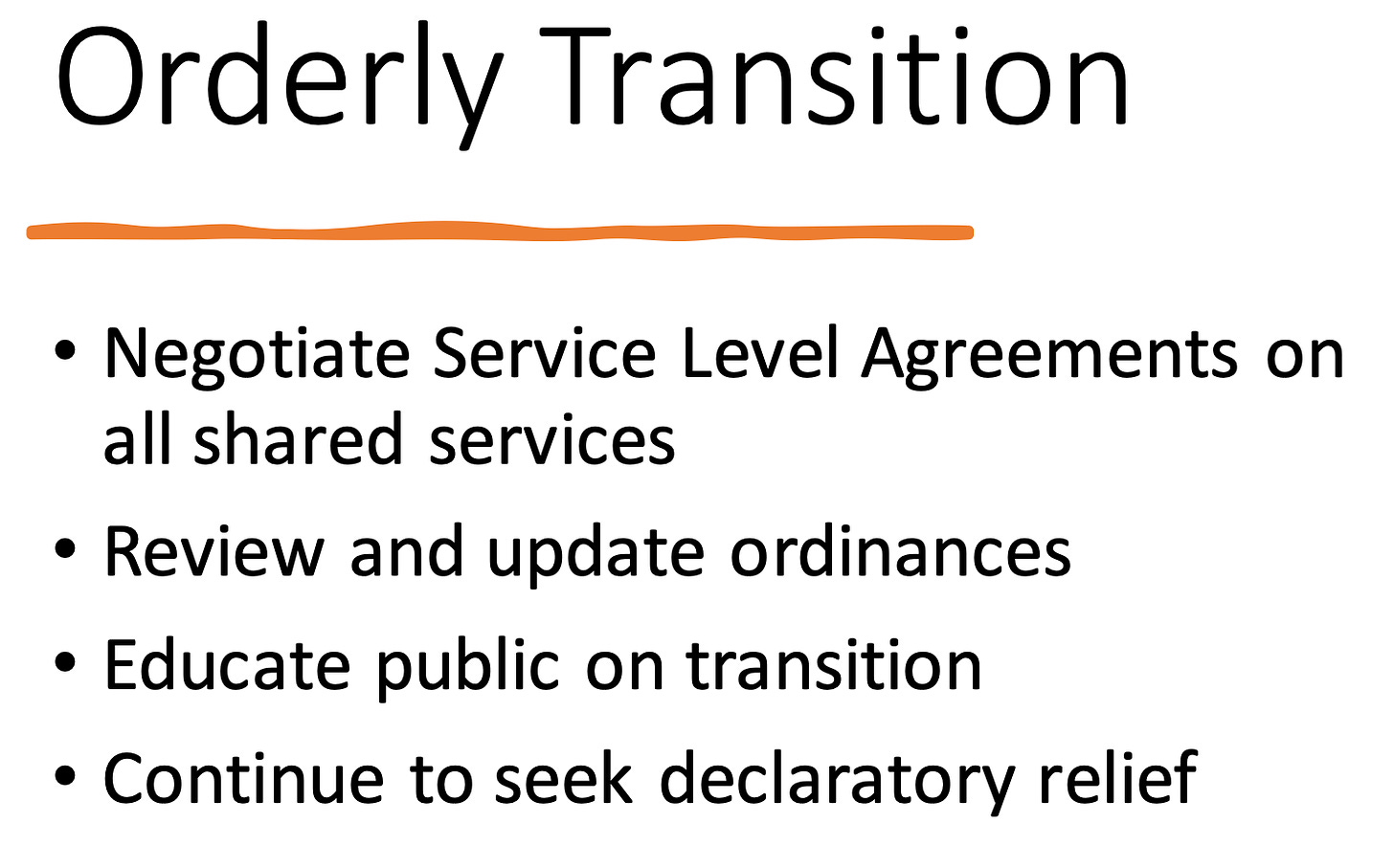
My hope is that Gov. DeSantis and his appointees, having successfully taken over swaths of the City of Gainesville in the most aggressive way imaginable, will step back from their autocratic moves and show the people of our community that they intend to govern thoughtfully, not punitively. Our community was wildly against this takeover, with GRU employees, the NAACP, the League of Women Voters, the Sierra Club, and others vehemently opposing it. The residents voted against a “GRU Authority” by huge margins in 2018. You need the support of the people to govern effectively. Working to build bridges would be the responsible way to move forward.
So far I’m not optimistic. The rhetoric from conservative activists and operatives has only gotten more aggressive, in spite of getting everything they wanted. Rep. Clemons, who at one time called for “bringing the community together” is now calling for the ouster of all seven of Gainesville’s local elected officials.
The Gainesville City Commission is in denial, this lawsuit will only cost the taxpayers more money. Perhaps this action will be the last straw before a recall effort begins to remove bad decision-makers from office.
None of this is helpful. What GRU, and the city, needs right now are people who are willing to work together and do what’s best for the community, not bring more culture war politics and petty score-settling to a $2 billion utility.
How this goes, and to what extent, will be clearer by the end of the month.
Read more:
Correcting the Misinformation on GRU
The GRU Takeover is signed: here’s what comes next
State preemption on tenant protections
CS/HB 1417 passed the Legislature last year as a complete and total preemption of cities protections for renters. It is a big handout to landlords in these communities, who were looking to eliminate the estimated 46 ordinances in 35 cities in Florida that protect renters from unscrupulous landlords. These include bans against “source of income” discrimination, notice requirement for terminating of rental leases, security deposits, and others.
It doesn’t appear that the goal of the bill was to harm two policies in Gainesville that are important to our community, but that is the end result. The occupancy limit and the city’s rental inspection program are now dead as a result of this bill.
The occupancy limit limits no more than 3 unrelated persons from living together in a single-family zoned property. The rental inspection law had staff inspect rental properties to ensure they were meeting minimum housing standards, as well as some additional energy efficiency standards. It was a good ordinance that ensured homes were safe for people to live in and helped reduce GRU bills for renters.
It wasn’t the intent to eliminate these ordinances, but it’s the result. As Mayor Harvey Ward said at the meeting:
It's the result, frankly, of sloppy bill writing again. And there’s just circumstance after circumstance where we're finding that to be true, both locally and across the state. That's remarkably disappointing because the opportunity to write good bills that are specific is available.
Now both policies are gone, as well as anything else that may “regulate the landlord-tenant relationship.” The result is also eliminating 11 positions within our City. That’s 11 people, on top of the 75 the City already let go at the demands of the Legislature, that are now victims of state overreach. These were passionate civil servants in our city that really believed in what they were doing: keeping people safe in their homes. We don’t know what happens to them now.
It’s all sad, and particularly because the housing crisis has led to some awful practices from unscrupulous landlords. As the supply of housing shrinks it puts more power in the hands of landlords, who don’t have to compete against one another for tenants like they used to. The result is higher rents and less accountability, worse living conditions for higher costs. It’s more than a Gainesville problem, across the United States we’re seeing issues like these, but we tried to find solutions here locally. That’s now gone.
Whether we can continue to protect tenants, hold landlords accountable for noise violations and trash issues, or to protect renters from discrimination, is something our staff is looking into and will hopefully find solutions.
Real proposals for single-family zoning
On August 10th the City Commission will have a conversation about what, if anything, we’d be willing to support as it relates to single-family zoning reform. The cost to buy or rent a home is high, it is going up, and there’s consensus amongst experts that overly-restrictive single-family zoning laws like Gainesville has are a big reason for that.
Last year the previous Gainesville City Commission passed sweeping changes to single-family zoning that allowed quadruplexes across the City, which was reversed by the current Gainesville City Commission in June.
I voted against that reversal for reasons I went into great detail on in my article “Gainesville’s New McMansion Zoning Code”. Essentially, I don’t have a problem reinstating single-family zoning, but the restrictions we have on single-family lots are absurdly restrictive and outdated, and need to be reconsidered.
On August 10th I have four proposals that keep single-family zoning in place but lowers the time, cost, and red tape for building smaller, infill single-family homes. These are:
Simplifying and streamlining the platting process for new subdivisions
Allowing homes to be built around a central green space instead of fronting a road, called a “cottage neighborhood”
Reviewing GRU water/wastewater connection fees to reduce the cost for small, infill single-family homes
Simplifying the single-family zoning code and allowing more flexible lot dimensions
You can read the proposal itself here. The last one is the most important, both in terms of reducing the cost of new housing and the ability to build more homes for more families in our city. This proposal essentially allows homes with smaller lot dimensions across Gainesville, the same lot dimensions as Pleasant Street (Residential Conservation Zoning) and are common in developments like Town of Tioga or Duckpond.
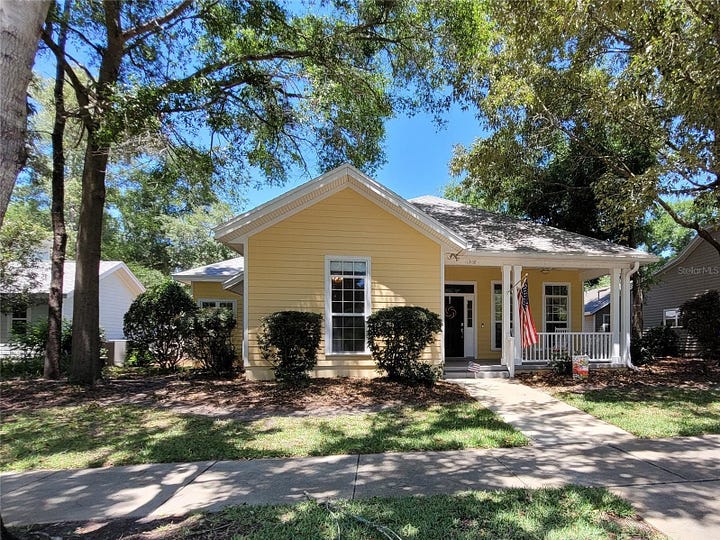
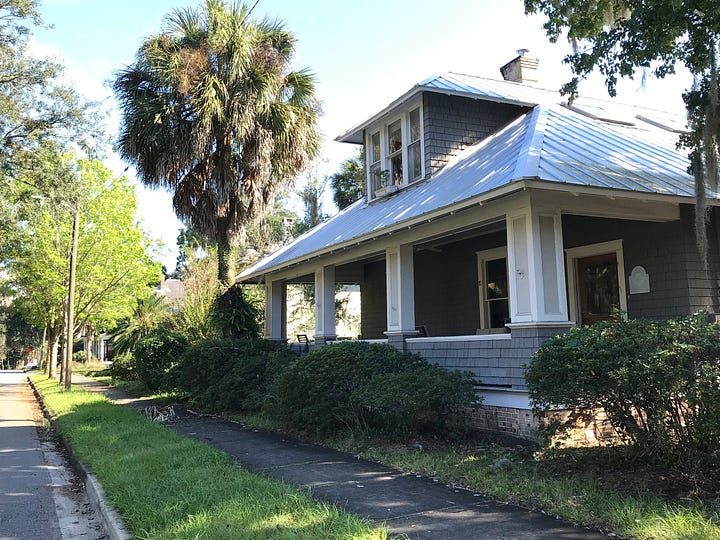
As I point out in my recent zoning post, these very restrictive lot dimensions make my home, a modest but spacious 1,100 sq. ft. single-family home on .13 acres, illegal to build across 96.2% of the single-family lots in Gainesville. I’m not alone, many of our older neighborhoods are filled with small starter homes like mine, but local zoning laws that have gotten more and more restrictive over the decades have essentially regulated these out of existence. That has a huge impact on housing availability and affordability, and promises a future of “McMansions” in Gainesville instead of working-class homes.
Giving more flexibility on your lot will allow more small starter homes, makes it easier for small-scale local builders to thrive, and helps to better utilize our existing land to ensure more families can live in homes with their families. It’s a win-win that I hope other Commissioners will consider as a middle ground that helps solve our housing issues while preserving neighborhood character.
Some Local Highlights
District 4 Business
Corterie Market opened in District 4 last month, it’s a cute little shop by Cypress and Grove that sells local art and candy. Check it out!

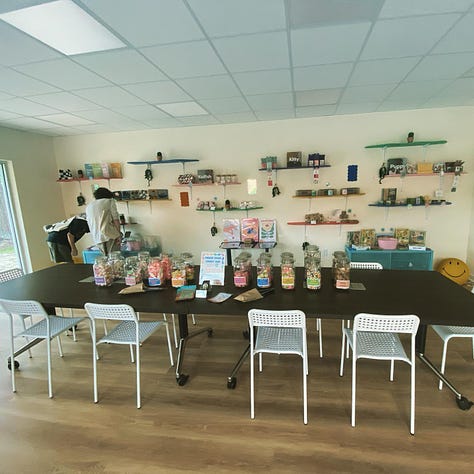

Local Music Highlight
There’s very few “originals” in music, but Purple Kloud is one of a kind. You’ll see him playing around town a lot recently, he’s a mix of folk and hip-hop wrapped in his own cosmic vibes. It’s very good music and it’s well worth seeing a show of his:
Gun Violence Summit
The City is hosting a gun violence summit on August 6-7 and we’d love to see you there. Shootings in Gainesville rose significantly during the pandemic, with another double homicide just last weekend. It is a hard change from a city that has, historically, not faced the kinds of gun violence you see in surrounding communities. We’re looking for community engagement and solutions from our community on this difficult issue. Sign up here.

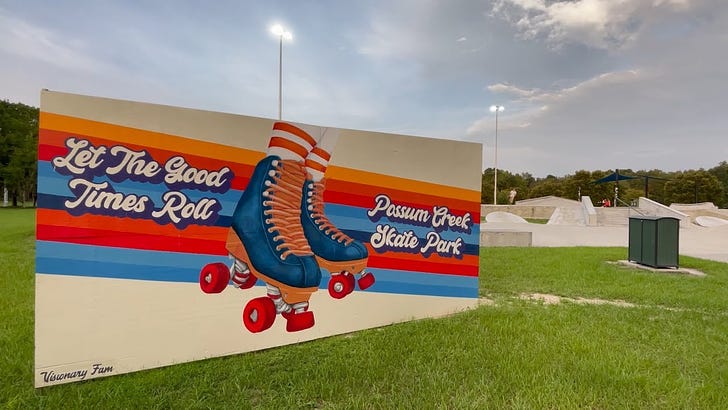

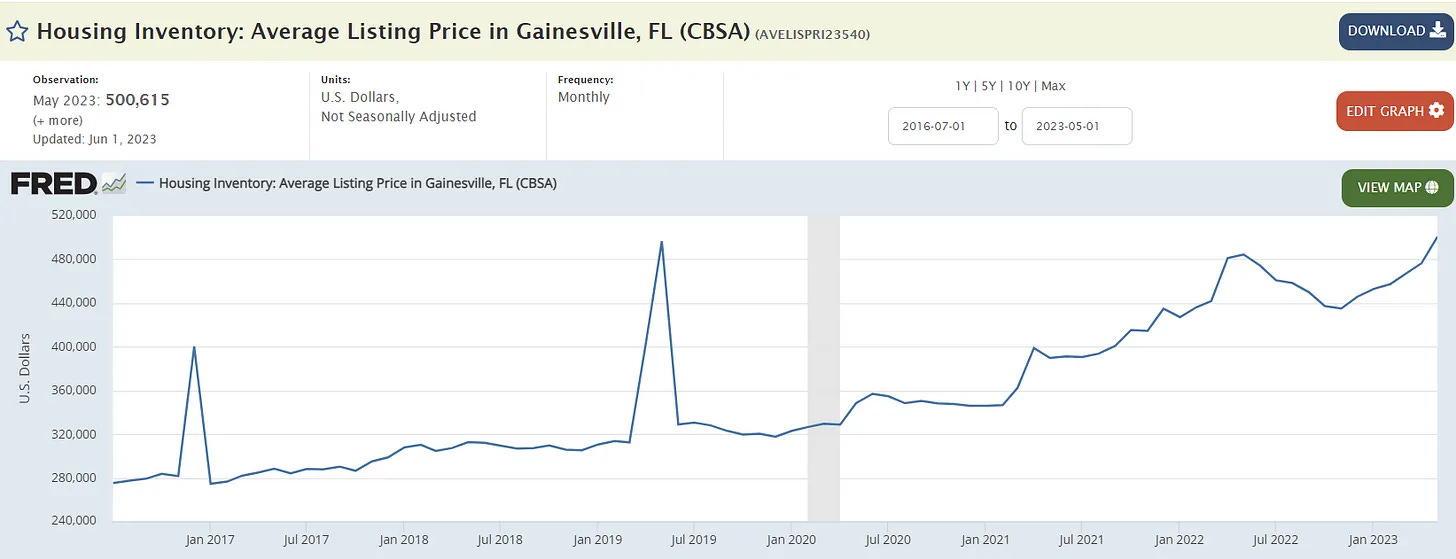

Can you tell me what is being built at corner of NW 16 Blvd & NW 43rd St?
I don't think City Government should be in the business of enforcing a ban on "unrelated persons" living on the same property, but maybe that's just me.